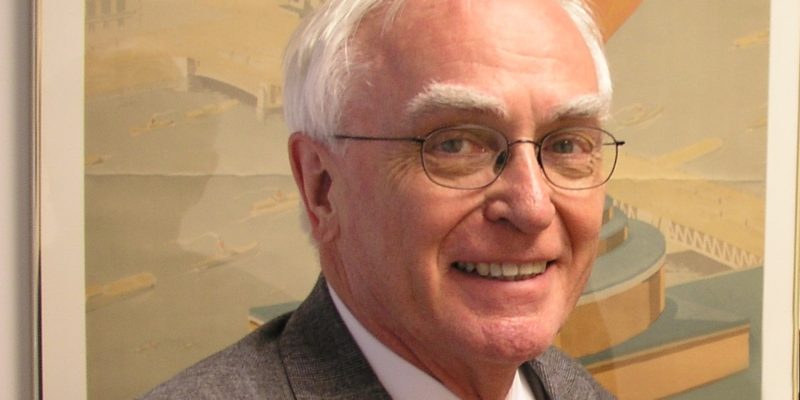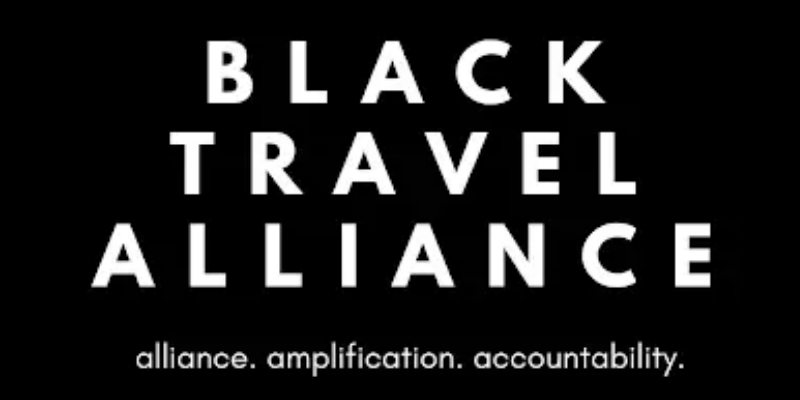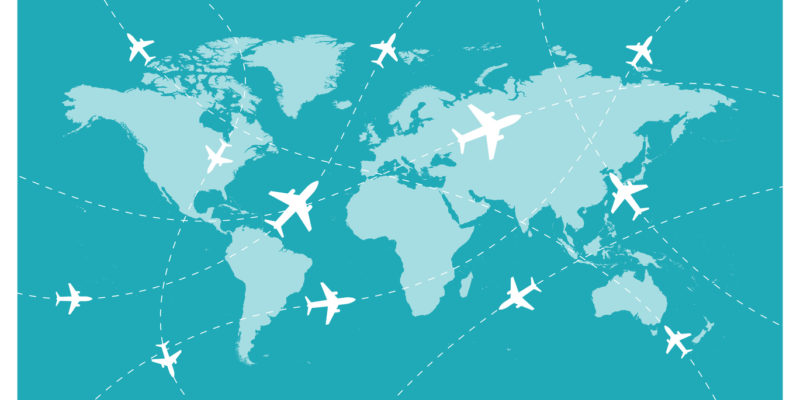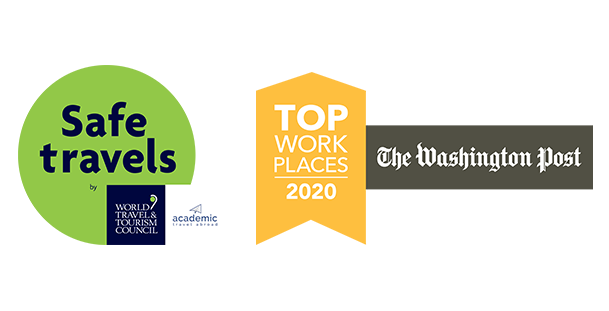A Tribute to David Parry Dave Parry, a born educator, had a career in academics before acquiring Academic Travel Abroad in 1972. An eternal student, he was driven by an intense intellectual curiosity and thirst for knowledge, and devoured books to seemingly no end. Once at ATA, the teacher within continued to emerge as Dave reliably instilled solid values of respect, integrity, loyalty, and strength in all he hired and trained. But the teaching didn’t end there. Those of us who were lucky enough to travel with him quickly discovered Dave’s “inner study leader”—we became diligent students as he lectured on World War II, the Czars of Russia, the Cold War, East Berlin, the economic principles of John Maynard Keynes, and so much more—all while hiking a mountain or hopping on a train. And so it is fitting that Dave Parry holds a place in ATA’s history that is as great and venerable as the larger-than-life historical figures he knew so much about. He was a “lion of a man,” in every respect. Dave was also a natural diplomat, always masterfully communicating (even through interpreters!) and managing to find common ground during the most difficult of meetings. His ability to navigate a cultural divide was a testament to his respect and appreciation of humanity and all its diversity. Whether it was downing a glass of vodka at 10am to celebrate a Russian ship captain’s birthday or urging a Chinese Vice Premier to lower prices post-Tiananmen Square, Dave charmed and persuaded with a keen sense of humor that translated into every language. Hiking mountains with Dave was when you would see his inner child emerge, full of wonder and mischief! His eyes sparkled and his pace quickened as he embarked on a hike, eager for adventure. All his worries melted away as he stood in awe before vistas of sparkling mountain lakes, verdant rolling pastures and meadows of wildflowers against brilliant blue skies. While most hikes were official R&D for the business, these adventures into nature were also how Dave re-charged and was able to power through the stresses of leading a travel company. Dave possessed a warmth and caring that everyone who has worked for him had the chance to witness. He often went above and beyond what any employer is expected to do to help someone in need—allowing telecommuting after the death of a parent (at a time well before telecommuting was permitted or even acknowledged by most companies), offering to share his 65th birthday with a free hike for a few lucky lottery winners, providing personalized travel guidance to an employee embarking on a honeymoon, allowing all staff to leave work to attend the funeral for a colleague’s father, and more. And then there is his resilient legacy at Academic Travel Abroad. With his brilliant wife, Susan, Dave built an organization that has thrived for 70 years through thick and thin. Since the early days of faculty-led student trips and Pan Am charters to Europe, ATA has now become a powerhouse of educational travel programs that span the globe and serve a variety of organizations and demographics. Dave led the company through many ups and downs, from OPEC and Chernobyl to Tiananmen Square and the Gulf Wars, from 9/11 to the Great Recession. A few weeks before his passing, Dave called Kate Simpson and noted “I was born in 1933, and this is the WORST I have ever seen!” referring to the current pandemic. But even then, he knew ATA would prevail and thrive again. Like Dave himself, ATA is a versatile, nimble organism that thrives on change and challenges. 2020 is Dave’s 87th year and ATA’s 70th. Through our work, we celebrate him. The legacy continues.
News & Announcements
Juneteenth, #PullUpForTravel
Juneteenth, #PullUpForTravel On this Juneteenth, we support the Black Travel Alliance and respond to their call to #PullUpforTravel. Academic Travel Abroad provides cultural and educational group travel experiences for leading media, cultural, and educational institutions in the US. We also operate study abroad programs for high school, gap, and college students through our study abroad division, CET Academic Programs, and organize delegations of professionals for international exchange through our brand Professionals Abroad. Compiling the data for the following applicable KPIs was an important exercise for us as an organization, and we share it transparently as part of our ongoing commitment to confront systemic racism in our own work. Employment Current number and percentage of Black people in management and on staff. Staff 6 out of 82 (7%) Managers 3 out of 62 (5%) Paid Advertising/Marketing Campaigns Black representation (number and percentage) in TV, radio, print and digital channels including social media in 2019. CET featured Black students and Black student-created content in 36 out of 92 social media posts (39%) from 2017-2020. 1 of 4 Instagram takeovers were hosted by Black students in 2019. CET features 366 photos showcasing students across 40 web pages marketing our study abroad programs. Of the 366 photos, 58 (15.85%) featured Black students. *Academic Travel Abroad does not run paid advertising or marketing campaigns for its programs created for partner organizations. Philanthropy Charitable contributions and support (i.e. mentorship and intern programs, etc.) to Black charities and community groups. ATA has donated $1.6 million to the Fund for Education Abroad (FEA) since its inception in 2010. FEA’s mission is to diversify participation in study abroad by providing scholarships and support to minority, first-generation, and high financial need students. 30% percent of FEA scholars are Black while only 6% of the general study abroad population is Black. In evaluating this data, we recognize that we have work to do in improving Black representation on our staff, in our management, and in our marketing campaigns. Moving forward, we intend to use these KPIs as a starting baseline for action as we take real steps toward racial equity within our own organization.
Our Statement on Racism and Injustice
We are in awe of the courageous communities across the U.S. (and the world!) taking action against police brutality, racial inequity, and other forms of systemic racism that target and harm Black communities. We are inspired by the crowds rising up in the streets, those donating money, time, and resources from home, and everyone taking this all to heart and educating themselves, their families, and their friends. We grieve for those that we’ve lost over the years and those lost recently: George Floyd, Breonna Taylor, Tony McDade, Ahmaud Arbery, and Nina Pop among too many others. But it is not enough to be in awe, we must all do the work. We, at Academic Travel Abroad, are committed to the long-term unlearning of biases within our own organization, as well as listening to and amplifying the voices of Black students, travelers, partners, and colleagues in educational travel and international education. As a first step, we are matching staff donations to organizations of their choice. We are also encouraging our staff to use their philanthropy leave to find their own meaningful ways to contribute to ongoing efforts. We don’t have all the answers, but we are committed to standing in solidarity with Black communities and doing our utmost to work toward a more equitable future.
Message from ATA Owners About COVID-19
Message from ATA Owners About COVID-19 Dear Partners, We are only a few months into 2020, and what a year it has been. Academic Travel Abroad is celebrating its 70th year in 2020, and like everyone else in the world, did not envision that this year would unfold in this way. We have experienced and persevered through many crises over the last seven decades including Chernobyl, Tienanmen Square, two Gulf Wars, 9/11, SARS, the Arab Spring, and the Great Recession. COVID-19 is truly unprecedented, yet previous crises have taught us that ATA and its study abroad division, CET Academic Programs, will survive to thrive again, made stronger through this test of endurance. It should come as no surprise, but many of our core truths have been reaffirmed during this time: our teams both in the U.S. and overseas perform brilliantly under great duress, approaching their work methodically, lucidly, and with compassion. Our suppliers and host universities abroad are integral to our ability to weather this storm through their flexibility, sacrifice, and support. And our partners in educational travel and study abroad continue to impress us with their professionalism, collaboration, and humanity throughout our joint handling of this crisis. We are forever grateful for all of you. After this extraordinary pause in human mobility, it is our hope that the lessons gleaned from this crisis will include a revitalized thirst for knowledge and exploration, a deeper compassion for this planet and all living creatures, an appreciation for the power of human connection, and a sincere reverence for life itself. Rest assured, we will be here and ready to help you and your travelers explore this new world when it welcomes us once again. Wishing you all around the world both health and peace, Kate Simpson Chase Poffenberger Mark Lenhart
Staff Achievements
We’ve always known we have talented employees at ATA. So when a team member is recognized by the outside world through awards or certifications, we are proud, but not surprised. Let us boast about a few of our most recent achievements: Kate Simpson, President of Academic Travel Abroad Surrounded by friends, industry colleagues, mentors, and supporters, Kate Simpson accepted the National Tour Association’s Woman of Vision award at the 2019 Travel Exchange convention. She was honored for both her commitment and leadership in the industry, as well as her work as a co-founder of the Fund for Education Abroad. Kate’s words in accepting the award inspired the room: I believe in the transformational power of travel, in all its forms. We all do noble work, and contribute to building a more enlightened, more just, and more connected world.” Jocelyn Flint, Senior Director of Employee Communications and Training In late December, Jocelyn earned the Association for Talent Development’s Instructional Design Certificate, an achievement that positions Jocelyn for the next step in her development: to become a Certified Professional in Learning and Performance. Jocelyn is devoted to learning and her assiduous pursuit of knowledge within the fields she works is not only impressive, but benefits the entire organization as she fastidiously applies her knowledge practically to her role at ATA. Congratulations, Jocelyn! Jennifer Calvert, Executive Director of the Fund for Education Abroad The Fund for Education Abroad (FEA) was founded by ATA executives, who serve on its board, and is heavily supported financially by ATA. FEA is committed to increasing the opportunities for dedicated American students to participate in high-quality, rigorous education abroad programs by reducing financial restrictions through the provision of grants and scholarships. Jennifer was awarded the prestigious Certified Fund Raising Executive certification in December of 2019. This impressive achievement validates what we have already known for a while—Jennifer is a gifted development professional, and her tenure at FEA is a gift to the organization. Her pursuit of this certification in the midst of all her FEA responsibilities is a testament to her hard work and dedication. We are proud to have Jennifer lead this organization that we so wholeheartedly support!
Actively Monitoring COVID 19
All future COVID-19 related updates can be found on our new, dedicated web page. We will continue to share updates on how we are monitoring and handling the situation as it unfolds. View the latest COVID-19 updates [February 25, 2020: Update to original post shared on January 22] As COVID19 continues to make world headlines, we would like to reiterate our approach to monitoring and assessing health risks to travelers. We are continually monitoring COVID19 using a full array of information sources, from data driven assessments—Center for Disease Control, World Health Organization, and the John Hopkins dashboard; to eye-witness accounts—stories from major media outlets and on-the-ground suppliers; to US policy-based sources—Department of State and OSAC; to our risk management partner, Global Rescue. In a situation such as this one, that has been known to change hourly, our approach is rigorous yet prudent. We follow the crest of new information, while balancing our assessments on both short-term waves and long-term undercurrents. During events such as these, we also believe that it’s important to streamline communications. We are in direct contact with affected travelers and partners as we make decisions and adjust plans to specific travel programs. For more general concerns, we maintain this web page as major situational updates demand. At the time of this writing, while we continue to monitor upcoming programs to Italy as well as other destinations, we have not yet cancelled any departures. If you have questions or concerns about your own travel program, we encourage you to reach out to Kate Simpson, President ([email protected] or 202-349-7332) or Chase Poffenberger, Executive Vice President ([email protected] or 202-349-7330). [January 30, 2020: Update to original post shared on January 22] On Thursday, January 30, the U.S. Department of State raised their China travel advisory from a level 3 (Reconsider Travel) to a level 4 (Do Not Travel) due to the 2019-nCoV (coronavirus) outbreak. Earlier the same day, the World Health Organization declared the coronavirus outbreak to be a Public Health Emergency of International Concern (PHEIC), allowing authorities to mobilize resources to contain the virus’ spread. (The WHO has applied this designation, created in 2005, five previous times: for the swine flu in 2009, polio in 2014 and Ebola and Zika in 2016 and most recently Ebola again in 2019.) We continue to monitor the developments in China through many sources, including this Johns Hopkins dashboard. Our study abroad (CET Academic Programs) spring China programs have been cancelled and any students who were in China have returned home or will return home shortly. At the time of this writing, we do not foresee cancelling or altering any of our non-China programs this spring. If you have any questions, please feel free to contact us at [email protected]. [Original post: January 22, 2020]Academic Travel Abroad is closely monitoring the recent outbreak of coronavirus and related cases of pneumonia in China. The illness was first reported on December 31, 2019 in Wuhan (in central China). There are now a number of cases in other major Asian cities as well as one in the United States. All individuals currently infected are believed to have contracted the virus while in Wuhan. Several countries have implemented public health measures and China is actively cooperating with international health organizations. At the time of this writing, the World Health Organization (WHO) and Centers for Disease Control (CDC) both provide tips for travelers heading to or currently in China and Wuhan. The CDC encourages all in the region to practice enhanced precautions for preventing colds and other respiratory illness. The US Department of State concurs with the CDC. In light of these recommendations, ATA plans to proceed with all programs in Asia at this time. We are providing our travelers with tips on staying healthy while traveling. We are monitoring this health issue daily through government, open access, and local informational channels and will update you should our plans require adjustment. If you have any questions, please feel free to contact us at [email protected].







